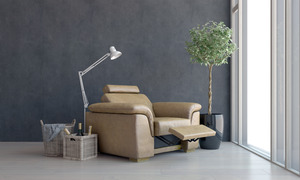
After being told that you have sleep apnea, you are doing a little research online to see if there’s anything you can do at home to manage your disorder. Surprisingly, you found that some people actually recommend sleeping in a reclining chair. It may not seem like an obvious solution, but some studies indicate that there’s good reason to think that it could help with your sleep-disordered breathing. Here’s why sleeping in a recliner may be a good idea if you have sleep apnea.
How Can Sleeping in a Recliner Help Reduce Your Sleep Apnea Symptoms?
The most common form of sleep apnea is obstructive sleep apnea. This condition is typically the result of the airway being blocked by the muscles near the back of your throat. These muscles can become relaxed when you fall asleep, causing them to collapse and cut off the flow of air.
But if you sleep in a recliner, your head will stay elevated while you snooze. As a result, your throat muscles will be less likely to block your airway, thus making your sleep apnea symptoms less severe.
There is research backing up the idea that sleeping in a recliner could be beneficial for people suffering from sleep-disordered breathing. A study in 2017 found that keeping the head elevated by 7.5 degrees had a significant positive impact on sleep apnea symptoms. Older studies have found that an elevation of 30 degrees or 60 degrees could also help.
How Should You Sleep in a Recliner?
Since you’re likely more accustomed to sleeping in a bed, it may take a bit of effort to make your recliner comfortable enough to sleep in. It often helps to get pillows for your neck and your lower back to ensure they’re properly supported during the night. You should use a footrest to keep your legs elevated; you don’t want too much blood to start pooling in your feet.
Be careful if you have a leather recliner; there’s a chance that you could end up sticking to the material. As a precaution, you may want to cover the recliner with a sheet before you settle down for the night.
And of course, there’s also the number of blankets to consider. Your body needs to stay at a certain temperature in order for you to enjoy a good night’s rest, so you will need to make sure that you have enough blankets for the sake of your comfort.
Of course, even if sleeping in a recliner does help improve the quality of your slumber, it’s no substitute for actual treatment. Be sure to speak to a professional to see if oral appliance therapy or another form of sleep apnea treatment could be right for you.
About the Author
Dr. David Thomas studied dentistry at the University of Pittsburgh and went to the Maricopa Institute of Health Services Hospital in Phoenix, Arizona for an AEGD residency. If you’re having trouble getting the rest you need due to sleep apnea, he may be able to help with oral appliance therapy. To schedule a consultation with Dr. Thomas at Seahurst Park Dentistry of Burien, visit his website or call (206) 244-4622.



